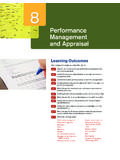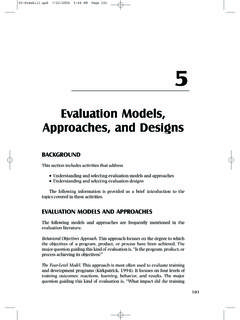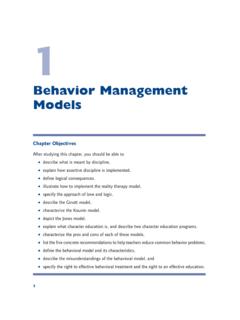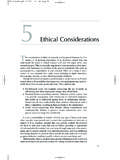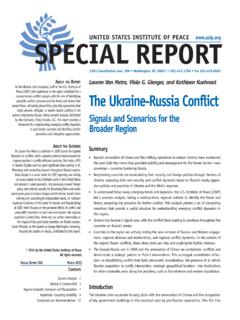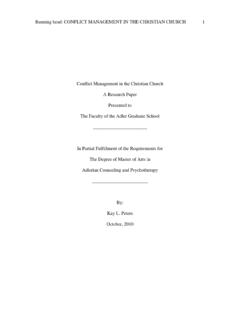Transcription of 11 Managing Conflict and Negotiation - SAGE Publications Inc
1 336 Part III: Group and Team Processes11 LEARNINGOUTCOMESA fter studying the material in this chapter, you will be able to:1. Define Conflict and its consequences2. Demonstrate an understanding of the types and levels of conflict3. Explain the role of culture in conflict4. Analyze various sources of conflict5. Apply the appropriate methods to manage conflict6. Apply the appropriate methods to prevent and reduce conflict7. Demonstrate knowledge of the Negotiation process and the key approaches to negotiation8. Identify non-effective Negotiation strategies and their causes9. Evaluate the consequences of conflictManaging Conflict and NegotiationConflict at Yahoo What happens when a successful 37-year-old working mom and CEO bans flexible work for her employees?
2 Aside from many disgruntled employees, she becomes the center of national controversy about women in the This is what happened to Marissa Mayer, CEO of Yahoo!, when she declared that employees would lose their telecommuting option and had to show up for work every day. Mayer who left Google to join Yahoo with high expectations for improved performance at Yahoo, joined the company when she was 5 months pregnant. She returned to work after a 2-week maternity leave after the birth of her son, who gets to stay in the nursery she built at her own expense next to her office so that she can work the long hours that have earned her the reputation of being a workaholic all of which received extensive media coverage.
3 As she was looking for ways to improve performance, Mayer noticed that the Yahoo parking lot was too empty in the early and late hours during which she was at the one of the youngest female CEOs and few women lead-ing a Fortune 500 company, Mayer was considered by many to be a role model for young Her actions triggered a deluge of e-mails, tweets, and commentary about the role of women in the workplace and her lack of support for other women. Mayer has not lived up to expectations of being a role model female CEO, but she has lived up to the promise of improving the company s bottom line and performance with a 50% increase in share The decision to ban telecommuting came suddenly and with a simple explanation from Mayer: We need to be one Yahoo!
4 , and that starts with physically being together. 4 Jackie Reese, Yahoo s HR chief said: To become the absolute best place to work, communication and collaboration will be important, so we need to be working. 5 Interestingly, just about the same time as Mayer Sample Only - Draft Version Do not copy or distribute sage Publications337PB Chapter 11: Managing Conflict and NegotiationsPart I: Group and Team ProcessesCreativity comes from a Conflict of ideas. Donatella VersaceSample Only - Draft Version Do not copy or distribute sage Publications339338 Chapter 11: Managing Conflict and NegotiationsPart I: Group and Team Processesbanned telecommuting, another company, Best Buy headed by a male CEO ended its own pioneering flexible work-from-home Little controversy ensued in that case.
5 Also released around the same time were several reports about the benefits of telecommuting to both employees and company bottom people with different goals and interests work together, the potential for disagree-ment is always present. This disagreement or Conflict may be about personal preferences, political differences, or organizational policies and procedures. It may reside largely below the surface, but it also may break into the open sometimes at the oddest times and, on occasion, latent Conflict may explode into sheer nastiness. Similarly, negotiating with oth-ers to reach or deal or to resolve Conflict is also part of all relationships inside and outside organizations.
6 You may experience Conflict with a friend, a classmate, a coworker, a super-visor, or a subordinate. In organizations, as in personal relationships, Managing Conflict constructively and negotiating well are students of organizations view Conflict as Negotiating to resolve such Conflict or to make deals is an inherent part of a manager s job. In addition, the current trends toward workforce diversity, globalization, and partnerships with other organiza-tions are making increasingly important the way in which managers from different orga-nizations and cultures deal with Conflict and ConflictConflict is a process in which people disagree over significant issues, thereby creating fric-tion.
7 For Conflict to exist, several factors must be present: People must have opposing interests, thoughts, perceptions, and feelings Those involved must recognize the existence of different points of view The disagreement must be ongoing rather than a singular occurrence People with opposing views must try to prevent one another from accomplishing their can be a destructive force. However, it can also be beneficial when used as a source of renewal and creativity. Before we look at views, sources, consequences, and ways to manage Conflict , note that we often use the terms Conflict and competition interchange-ably, although the two differ.
8 Competition is the rivalry between individuals or groups over an outcome and always has a winner and a loser. While competition can be one of the sources of Conflict , Conflict does not necessarily involve winners and loser; we can have Conflict over issues, but cooperate so that no one loses or of ConflictThere are two general views of Conflict . First, Conflict can be considered a negative force and dysfunctional that it makes people feel uncomfortable and, consequently, makes Conflict cannot survive without your participation. Wayne DyerOne of the greatest powers we have in a Negotiation is the power to NOT react.
9 William UryConflict: a process in which people disagree over significant issues, thereby creating frictionCompetition: rivalry between individuals or groups over an outcome; always has a winner and a loserSample Only - Draft Version Do not copy or distribute sage Publications339338 Chapter 11: Managing Conflict and NegotiationsPart I: Group and Team ProcessesHOW DO YOU BEHAVE DURING Conflict ?The following questions provide additional insight into how you behave in Conflict Answer each question as to the extent that you think or believe that the statement is Do you believe that in every Conflict situation, mutually acceptable solutions exist or are available?
10 123452. Do you believe that in each Conflict situation, mutually acceptable solutions are a desirable thing?123453. Do you favor cooperation with all others in your everyday activities and disfavor competition with them?123454. Do you believe that all people are of equal value regardless of age, race, religion, culture, or gender?123455. Do you believe that the views of others are legitimate ( , genuine, accurate, true) expressions of their positions?123456. Do you believe that differences of opinion are helpful and beneficial?123457. Do you believe that others are worthy of your trust?123458.

